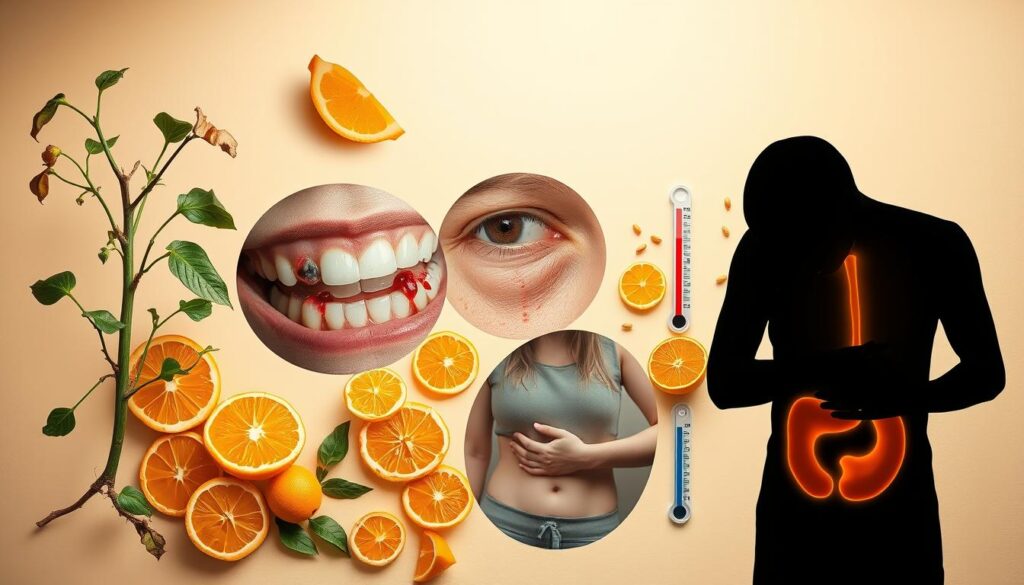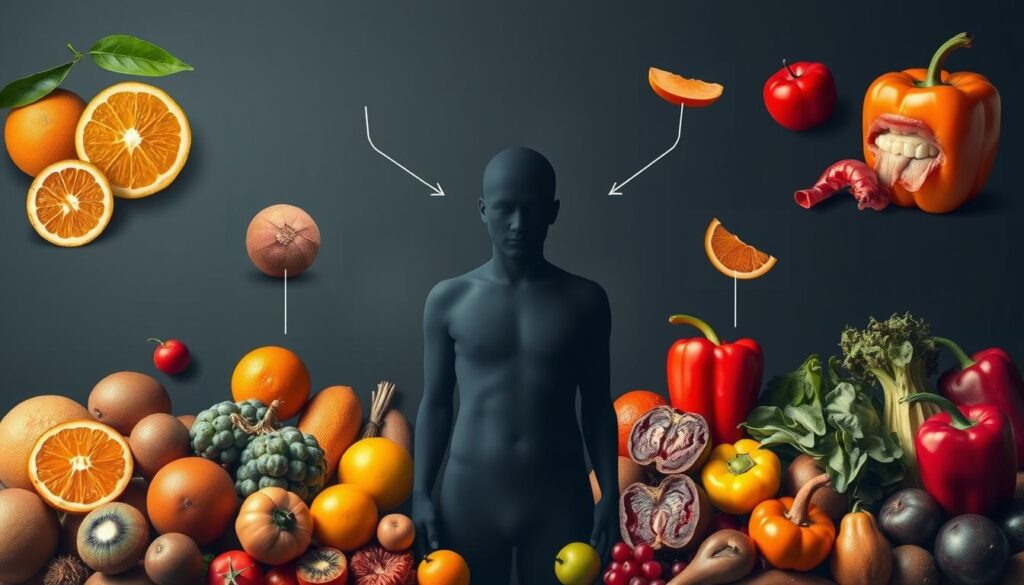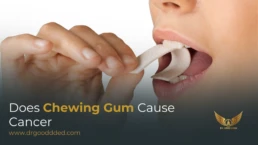Vitamin C deficiency can cause many symptoms, from mild to severe. It’s important to know the signs to prevent it. About 7% of adults in the US have this problem.
Table of Contents
TogglePoor diet, alcoholism, and smoking are some causes. It’s key to understand why vitamin C deficiency happens. Signs include fatigue, easy bruising, and dry skin.
Knowing about vitamin C deficiency can help your health. It can affect wound healing and cause joint pain. But, getting enough vitamin C can help, taking about three months.
By knowing the risks and signs, you can keep your health good. It’s important to know how to avoid vitamin C deficiency. Keeping enough vitamin C is key to staying healthy.
Understanding Vitamin C and Its Role in Your Body
Vitamin C is very important for your health. It helps keep your skin, bones, and connective tissue strong. It’s a water-soluble vitamin that helps make collagen, a key protein.
This vitamin is found in foods like citrus fruits, strawberries, and bell peppers. It’s also in supplements, but always talk to a doctor before taking them.
- Citrus fruits such as oranges, lemons, and grapefruits
- Strawberries, kiwis, and other berries
- Bell peppers, broccoli, and other leafy green vegetables
Eating foods rich in vitamin C helps keep you healthy. It prevents you from needing treatment for a lack of vitamin C.
Common Symptoms of Vitamin C Deficiency You Shouldn’t Ignore
Vitamin C deficiency can cause many symptoms. If you notice any, get medical help fast. Eating foods rich in vitamin C can help treat it.
Bleeding and Swollen Gums
Bleeding and swollen gums are signs of vitamin C deficiency. Eating grapefruit for 2 weeks helped some people with gum disease.
Slow Wound Healing
Slow healing of wounds is a symptom too. Vitamin C helps make collagen, which is key for healing.
Frequent Bruising
Frequent bruising is another sign. Vitamin C keeps blood vessels strong, so without it, they get weak and bruise easily.
Dry and Rough Skin
Dry, rough skin is common too. Vitamin C helps skin stay healthy by making collagen and elastin.
Eating foods like citrus fruits, strawberries, and bell peppers can help. They are full of vitamin C and can keep symptoms away.

If you see these symptoms, see a doctor right away. Treatment can make symptoms better and prevent bigger health issues.
Hidden Signs That Might Surprise You
Vitamin C deficiency can cause many hidden symptoms. These include joint pain, dry and scaly skin, and poor wound healing. If you notice these signs, see a doctor right away.
Some other hidden signs of vitamin C deficiency include:
- Red spots around hair follicles, indicating fragile blood vessels
- Corkscrew hair on the body, a characteristic sign of scurvy
- Depression and cognitive impairment, affecting mental health and mood
- Chronic fatigue, making the body more prone to illness
It’s important to know these symptoms and prevent them. Eating foods rich in vitamin C can help. If you have these symptoms, talk to a doctor.
Living a healthy life can stop vitamin C deficiency. Knowing the signs helps protect your health. Enjoy the benefits of vitamin C by eating right and staying healthy.

Mental and Emotional Indicators of Low Vitamin C Levels
Vitamin C deficiency can cause many mental and emotional symptoms. You might feel very tired and irritable. This can really affect your daily life.
A study on vitamin C deficiency symptoms found that fatigue and irritability are common signs. If you notice these, you should see a doctor.
Depression and mood swings are also signs of vitamin C deficiency. If you’re feeling down or your mood keeps changing, get help. Treating vitamin C deficiency can greatly improve your mood and mental health.

Vitamin C deficiency can also affect your brain. You might find it hard to focus or remember things. But, treating the deficiency can help your brain work better again.
It’s important to know the signs of vitamin C deficiency. Taking action can help keep your mind and emotions healthy.
Some common signs of low vitamin C levels include:
- Fatigue and weakness
- Irritability and mood changes
- Depression and anxiety
- Cognitive impairment and difficulty concentrating
Risk Factors Making You More Susceptible
Vitamin C deficiency can happen for many reasons. These include a bad diet, smoking, and some health issues. If you don’t get 7 to 8mg of vitamin C daily, you’re at risk. Vitamin C deficiency causes can be stopped by living healthy and eating well.
Some risk factors for vitamin C deficiency are:
- Eating too few fruits and veggies
- Smoking and using drugs or alcohol
- Poor nutrition and serious illness
- Pregnancy or breastfeeding without a good diet
Babies, kids, and seniors are more likely to lack vitamin C. This can lead to problems like easy bruising and poor healing.
Knowing the risks and taking steps to prevent them can help. A healthy lifestyle, good diet, and exercise are key. They help avoid vitamin C deficiency and keep you feeling great.
Prevention and Treatment Strategies
To avoid vitamin C deficiency, eat foods high in vitamin C. Oranges, lemons, and strawberries are good choices. You might also want to take vitamin C supplements. The vitamin C deficiency article suggests 90 mg for men and 75 mg for women each day.
To treat vitamin C deficiency, change your diet and consider supplements. Add foods like tomatoes, bell peppers, and broccoli to your meals. Taking vitamin C supplements can also help. If symptoms are bad, see a doctor right away. They can help a lot in 24-72 hours.
- Maintaining a balanced diet with adequate vitamin C intake
- Considering vitamin C supplements after consulting with a healthcare professional
- Seeking medical attention for severe symptoms of scurvy
By using these tips, you can prevent and treat vitamin C deficiency. This keeps you healthy and feeling good.
Conclusion: Taking Control of Your Vitamin C Health
Understanding vitamin C deficiency is key for your health. By knowing the signs, you can help your body get enough vitamin C benefits.
Eating more foods high in vitamin C or using supplements can stop deficiency. Your body needs vitamin C for your immune system, skin, and more.
By focusing on vitamin C, you can feel better and enjoy its many benefits. Listen to your body and choose wisely to keep your vitamin C levels up. This will make you healthier and happier.
FAQ
What is vitamin C and why is it important for my health?
Vitamin C is a water-soluble vitamin. It helps keep you healthy and strong. It’s key for making collagen, which is in your skin and bones.
Vitamin C also boosts your immune system. It helps wounds heal and makes iron easier to absorb.
What are the daily recommended intake levels for vitamin C?
Adults need 75-90 milligrams of vitamin C each day. Smokers need 35 milligrams more.
Where can I find natural sources of vitamin C?
You can find vitamin C in fruits and veggies. Citrus fruits, bell peppers, and broccoli are good sources. Strawberries and tomatoes also have a lot of vitamin C.
What are the common symptoms of vitamin C deficiency?
Signs of vitamin C deficiency include bleeding gums and slow healing. You might also bruise easily and have dry skin.
If you notice these symptoms, see a doctor.
What are some of the hidden signs of vitamin C deficiency?
Vitamin C deficiency can cause fatigue and mood swings. You might feel irritable or depressed.
These signs might surprise you. If you notice them, get medical help.
How can vitamin C deficiency impact my mental and emotional well-being?
Lack of vitamin C can make you feel tired and moody. It can lead to depression and mood swings.
Getting enough vitamin C can improve your mood and energy.
What are the risk factors that can make me more susceptible to vitamin C deficiency?
Poor diet and smoking can raise your risk. Certain health conditions also increase it.
Stay healthy and manage your health to avoid vitamin C deficiency.
How can I prevent and treat vitamin C deficiency?
Eat more foods rich in vitamin C to prevent deficiency. You can also take supplements.
Living a healthy lifestyle helps too. If you have symptoms, see a doctor for help.
Source Links
- 15 Signs and Symptoms of Vitamin C Deficiency
- 14 Signs and Symptoms of Vitamin C Deficiency
- Vitamin C deficiency

This article is medically reviewed by Dr. Chandril Chugh, Board-Certified Neurologist, providing expert insights and reliable health information.
Dr. Chandril Chugh is a U.S.-trained neurologist with over a decade of experience. Known for his compassionate care, he specializes in treating neurological conditions such as migraines, epilepsy, and Parkinson’s disease. Dr. Chugh is highly regarded for his patient-centered approach and dedication to providing personalized care.








